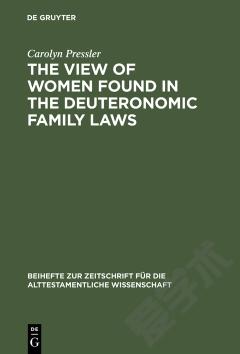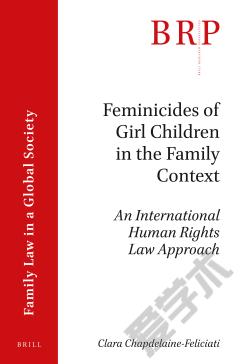The View of Women Found in the Deuteronomic Family Laws
In this revision of her 1991 doctoral dissertation from Princeton Theological Seminary, Carolyn Pressler examines four sections of Deuteronomic law which apply to women in order to test the theory, put forward by other biblical scholars, that Deuteronomy affords women a more favorable legal status than do other biblical legal codes. Pressler concludes that there is no merit to this view. All biblical law, Deuteronomy included, curtails the freedom of women, particularly over their sexuality, for the sake of preserving male-dominated family structures. She notes, however, that these same laws afforded women and their children certain rights and protections within their subordinated legal status as daughters, sisters, wives, and mothers. She engages her test cases at great depth and deftly traces their nuances, providing the reader with an invaluable insight into the polyvalent ancient culture of which they were a part. Especially valuable for those not immediately familiar with ancient Israelite kinship systems, are her sections entitled "The Social and Familial Patterns Assumed by the Laws." Her review of literature on legal issues related to women in ancient Israel is valuable for specialists and non-specialists alike. Pressler's first set of cases is Deuteronomy 21:10-21, (9-20) which includes laws regarding captive brides, primogeniture, and rebellious children. The law regarding captive brides (Deut 21:10-14) clarifies the legal rights of wives who were originally taken as prisoners of war. Such foreign wives taken first as prisoners of war presented an ambiguity regarding what would become of them if their marriages were dissolved. Would they return to slave status, or would they be free? The law mandates that they leave marriage as free women. The law of primogeniture (Deut 21:15-17) protects the chronologically eldest son in a plural marriage context from being disinherited in favor of a younger son of a more favored mother. Finally, the law regarding rebellious children grants parents the right to have a rebellious son stoned for disobedience (Deut 21:18-21). Notably, this law prohibits a father from sentencing his son to death without the mother's consent. She has authority over the son on par with his. In all of these cases, Pressler notes, the absolute authority of the father in a hierarchical family
{{comment.content}}








 京公网安备 11010802027623号
京公网安备 11010802027623号